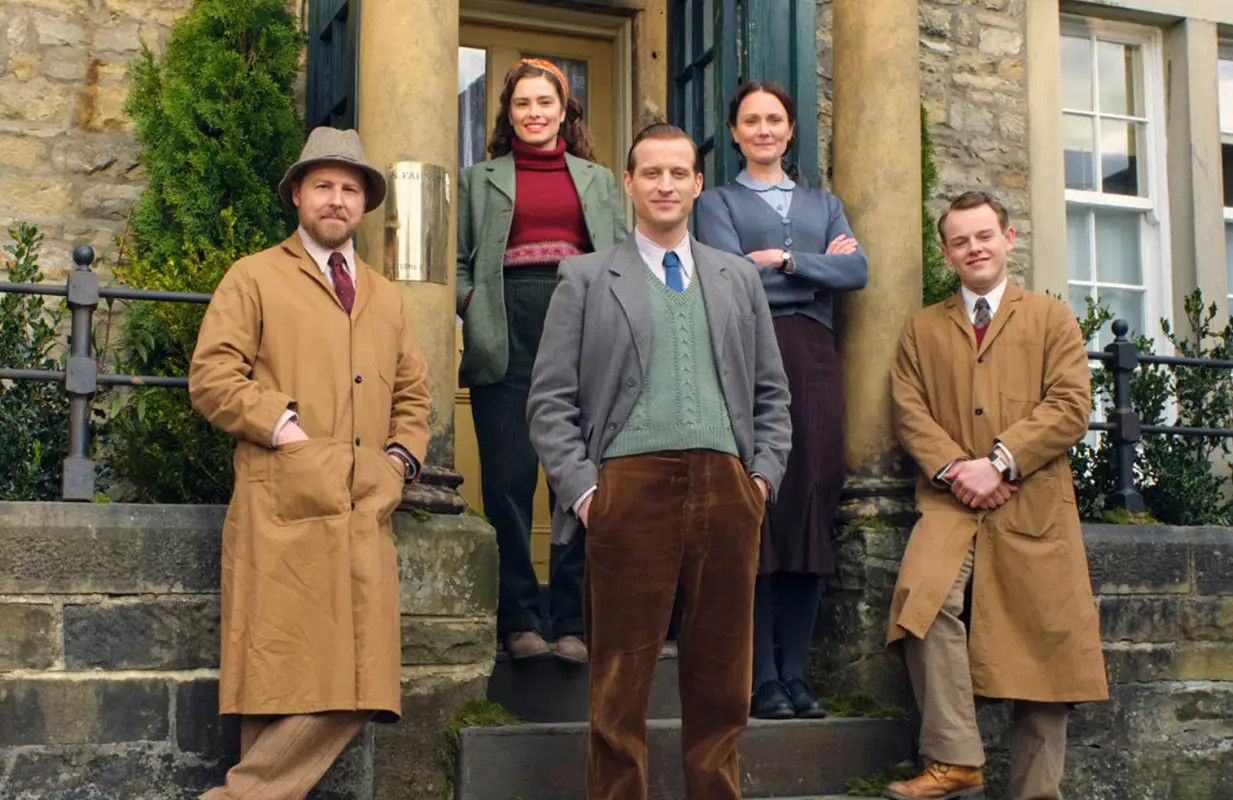All Creatures Great and Small Is a Balm to the Pandemic-Addled Soul
-
 The cast of All Creatures Great and Small, from left: Samuel West, Rachel Shenton, Nicholas Ralph, Anna Madeley, and Callum Woodhouse. (Photo: PBS)
The cast of All Creatures Great and Small, from left: Samuel West, Rachel Shenton, Nicholas Ralph, Anna Madeley, and Callum Woodhouse. (Photo: PBS)There are no winners in a pandemic, but if anything has come out on top over the past two years, it’s feel-good fare like Schitt’s Creek and Ted Lasso. These earnest comedies have proven to be the perfect antidote for COVID-times: the stakes are low, everyone operates in good faith, and obstacles are seen as opportunities to try something new, usually with positive results. Schitt’s Creek and Ted Lasso’s sweeping success has prompted a reevaluation in the comedy world, as networks and streamers have begun pursuing shows that showcase the best of humanity over dark dramedies (the trend of the mid-to-late-2010s). For whatever reason, the same hasn’t occurred on the drama side — until now.
Enter the British drama All Creatures Great and Small, best described with words like “delightful” and “endlessly charming.” An adaptation of the BBC series that ran from 1978 to 1990 (which was itself based upon a series of books written by Alf Wight under the pen name James Herriot), All Creatures Great and Small centers on a veterinary practice in the Yorkshire Dales, a rural area north of Manchester, in the late 1930s. Shortly after graduating veterinary college in Glasgow, James Herriot (Nicholas Ralph) is hired by Siegfried Farnon (Samuel West), an eccentric veterinary surgeon in the village of Darrowby. Siegfried wastes no time throwing James into the deep end: in his first week on the job, James gets shoulder-deep in a cow to turn around a breeched baby calf. He succeeds, the cow delivers a healthy calf, and the vets of Skeldale House celebrate a job well done with a cup of coffee and a warm breakfast. All in a day’s work.
With the exception of the show's two Christmas specials, every episode of All Creatures Great and Small follows this basic formula. James, Siegfried, and Siegfried’s younger brother Tristan (Callum Woodhouse) discuss the day’s cases over breakfast, cooked by the level-headed housekeeper Mrs. Audrey Hall (Anna Madeley). Siegfried and Tristan squabble over something — typically it involves the former not trusting the latter enough — and Mrs. Hall ends their bickering with a simple solution or a one-liner. Then they all go about their days, treating sheep for calcium deficiencies or healing cows with abscesses, reuniting again over dinner to rehash and reflect. Even when a storyline ends in tragedy (it’s rare, but animal lovers, be forewarned), it’s comforting to know that the next episode will bring a new case, a new opportunity for redemption, and new Tristan antics, so viewers are never left mired in gloom for long.
All Creatures Great and Small is interested in spreading positivity, and it seems to relish doing so. Tristan consistently gets in his own way, but when he finally succeeds, no one is more proud than Mrs. Hall, who encourages the men, particularly Siegfried, to extend grace and compassion to one another, no matter how frustrating the situation. Likewise, the veterinary cases and the interpersonal drama at Skeldale House teach James, Siegfried, and Tristan about their relationships to each other and to the animals they’re treating, leaving viewers with the same “maybe the world is full of good people, after all” vibes that typify Schitt’s Creek and Ted Lasso.
While All Creatures Great and Small is best in the little moments when it’s able to impart a pure-hearted (but never preachy) message, the show is not without intrigue. The first season sees James pine after the daughter of a local farmer, Helen Alderson (Rachel Shenton), and over the course of six episodes, he slowly works up the nerve to open up about his feelings. Elsewhere, Tristan reveals that he didn’t actually graduate from veterinary college, and his efforts (or lack thereof) to pass his final exams serve as the source for much of the drama inside Skeldale House.
Both of these storylines carry over into Season 2, which sees James and Helen’s romance come full circle, and brings the long-simmering tension between Tristan and Siegfried to a head. As a result, the drama’s sophomore run is slightly less procedural than the first, but the stars quickly adjust to their new normal. West is even more in command of the mercurial Siegfried, while Woodhouse continues to walk the fine line between scamp and scoundrel. Season 2 also expands Madeley’s role by giving Mrs. Hall a welcome few storylines independent of the men.
All Creatures Great and Small may still be an anomaly in TV's post-antihero age, but its earnest, low-stakes drama reminds us of humanity’s inherent goodness. After a difficult two years, it may not be what we deserve, but it’s what we need.
All Creatures Great and Small Season 2 premieres Sunday, January 9 at 9:00 PM ET on PBS. The entire first season is available to stream with PBS Passport and on the PBS Masterpiece Amazon Channel.
Claire Spellberg Lustig is the Senior Editor at Primetimer and a scholar of The View. Follow her on Twitter at @c_spellberg.
TOPICS: All Creatures Great and Small, PBS, Schitt's Creek, Ted Lasso